Red Rover
The mission of Red Rover was to create a platform for tech professionals at all levels, where they can network, pitch project ideas to find team members and build deliverables, as well as seek or provide mentorship. Our goal was to empower our users to use the platform to gain experience and grow in the tech industry and in their respective roles, whether they are entry level or more senior.
Project Scope
Volunteer project
Timeframe: 3 months
Role: UX Researcher
Team: Potoula Anagnostakos with two other researchers
Methods: Generative Research, Data Synthesis, Journey Map, Personas, User Stories, Evaluative Research
Tools: Userbit, Clickup
Deliverables:
User flows, stories, personas, journeys
Research plan
Competitive analysis, surveys
I volunteered as a UX Researcher on the project in its early stage. The immediate challenge was to identify the need for this type of platform, whether we could begin to potentially identify early adopters and could we bring this platform to life.
As the UX Research team, our objectives were to:
Gain insights into the needs, preferences, and behaviors of our target audience within the tech community, and to validate assumptions about the project concept.
Identify the types of users we were creating this platform for.
Lay out foundational base of research to build on for later project iterations.
Problem Entry level tech professionals and aspiring project owners need a platform to network with experienced professionals and recruit team members to build project deliverables.
Generative Research
At the time that I joined Red Rover, some initial research had begun, which included user interviews and surveys. The research team and I were tasked to analyze the responses from them to identify meaningful insights, themes, personas, and journey maps.
Once those were identified, we would then make recommendations as to next steps for research as well as how the Red Rover team could improve as a whole, wearing both volunteer and consultant hats.
The surveys had 12 questions each answered by 104 participants and there were 11 user interviews conducted. They were asked about their years of tech experience, what would motivate and not motivate them to join a platform or project, their experience if they started a project before, and how they would like to gain professional development.
Key insights that were uncovered from the survey responses highlighted that users felt that by collaborating on projects, they could gain significant professional development and network with other professionals in their field. The right platform would help users advance in their careers and provide mentorship opportunities, an aspect in which platforms in the market fell short.
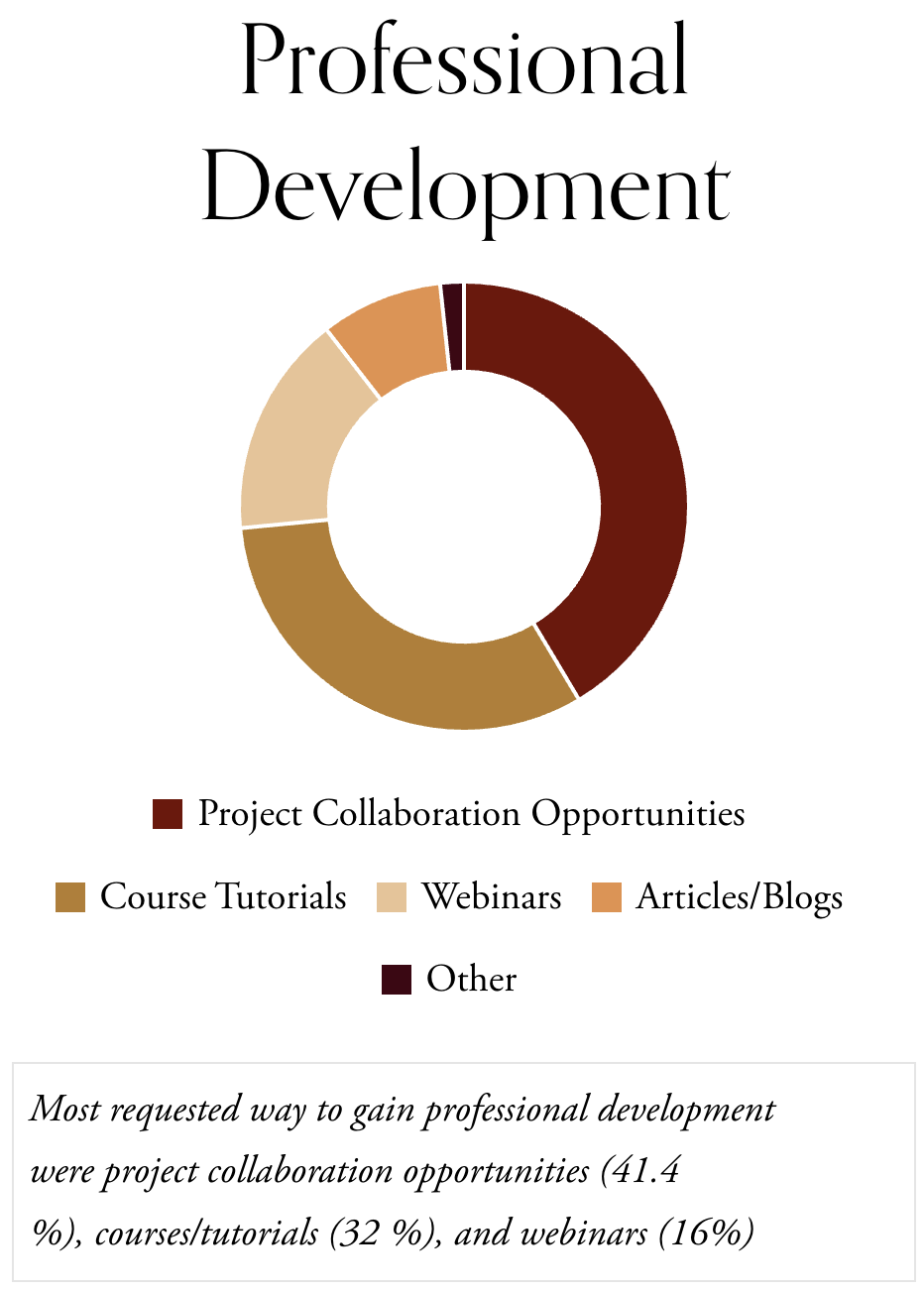

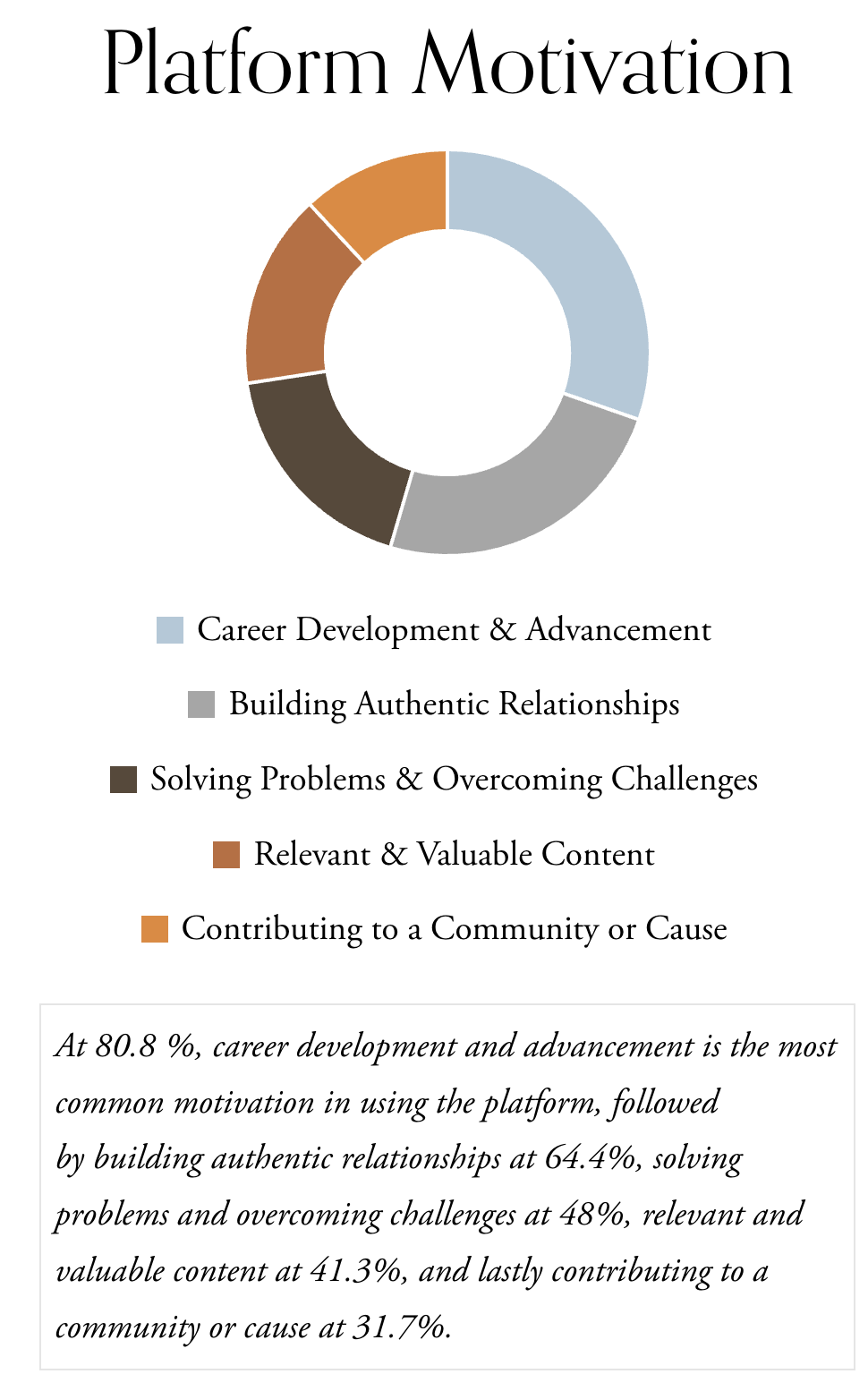
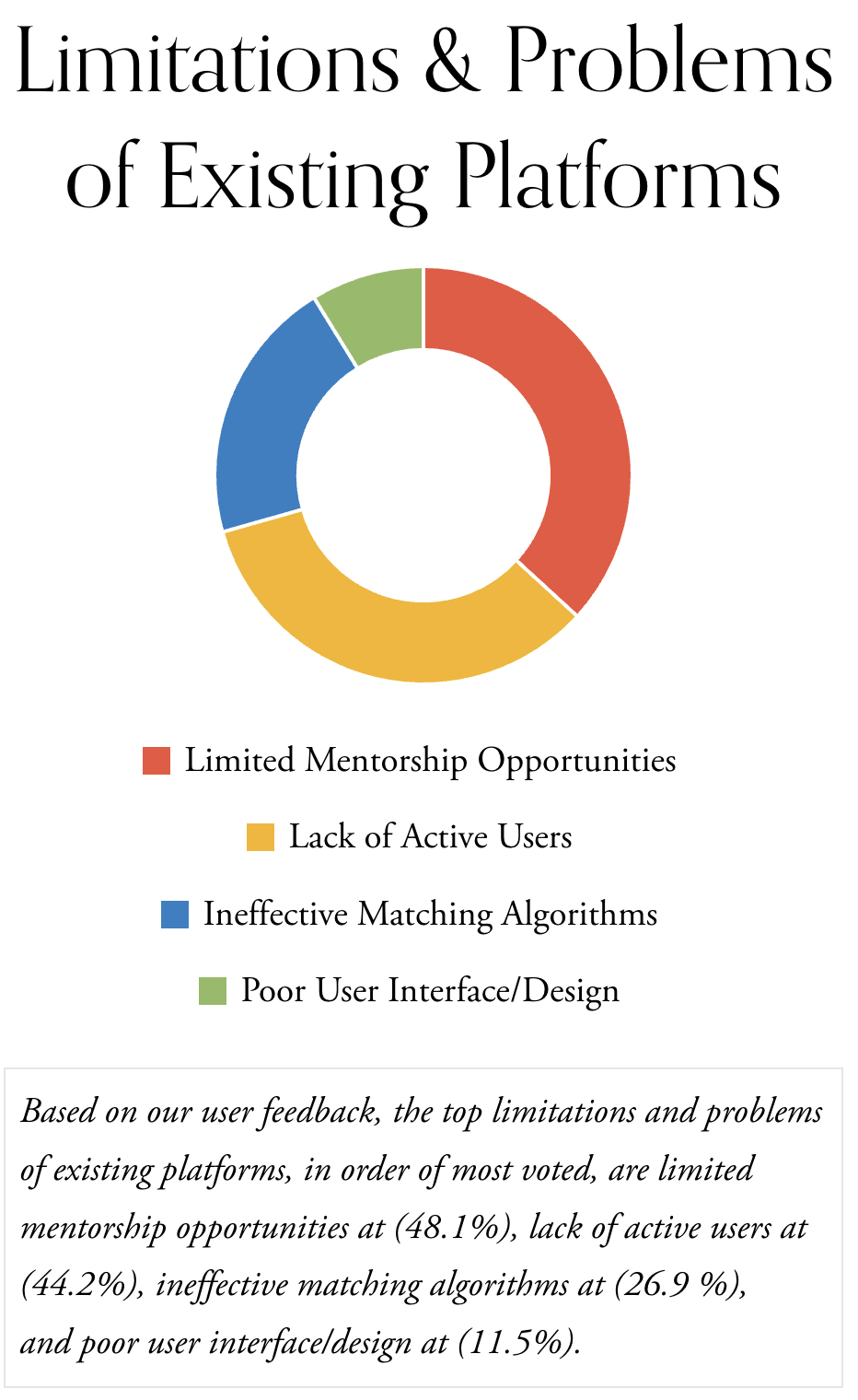
Prevalent and insightful topics of conversation that came from the user interviews were about time, networking, development, moderation, and community wellbeing.
Time is crucial in how people assess their involvement in projects and connections with people. Users echoed that they feel that they don’t have time, that they want to make sure that the people they connect with and the projects they create or work on are worth their time, and that they are also conscious of other people’s time.
Networking is essential to those that want to seek mentorship, find their next role, and meet others in the field. Users want to form genuine connections based on shared experiences and with peers rather than seek a mentor/mentee dynamic. They want to foster professional relationships to learn from one another and grow together.
Development greatly attributes to a person's career trajectory and they can seek professional development through different ways. Users want mentorship to further their careers along, no matter what level they’re currently at, however that dynamic can be challenging to maintain in the long run. They also want to learn new skills and gain practical experience to validate their skills as well as build their resumes.
Moderation is important to the wellbeing of project participants as well as verifying the validity of projects, essentially so people know what they signed up for. Users want projects to be vetted before they’re opened to participants. Other suggestions were to feel a comprehensive onboarding and profile setup process to improve transparency and accountability as well as to establish proactive channel moderation measures for safety purposes. 31.7% of survey takers wanted customizable user profiles.
Community Wellbeing is integral to a healthy networking environment. Career development in all its aspects is a full time job, support that extends to holistic well-being is appreciated. Users suggested community spaces. These areas would hold anonymous or open discussions where members can share personal challenges, seek advice, and receive emotional support from peers. 26.9% of survey takers wanted Q&A and community support. Users also suggested virtual co-working spaces to combat isolation and loneliness often experienced in remote work settings. This would foster camaraderie, collaboration, and organic networking opportunities.
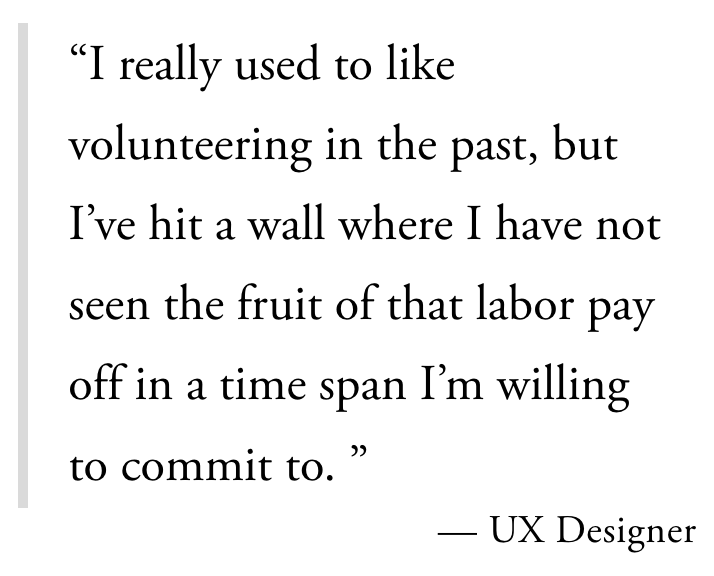



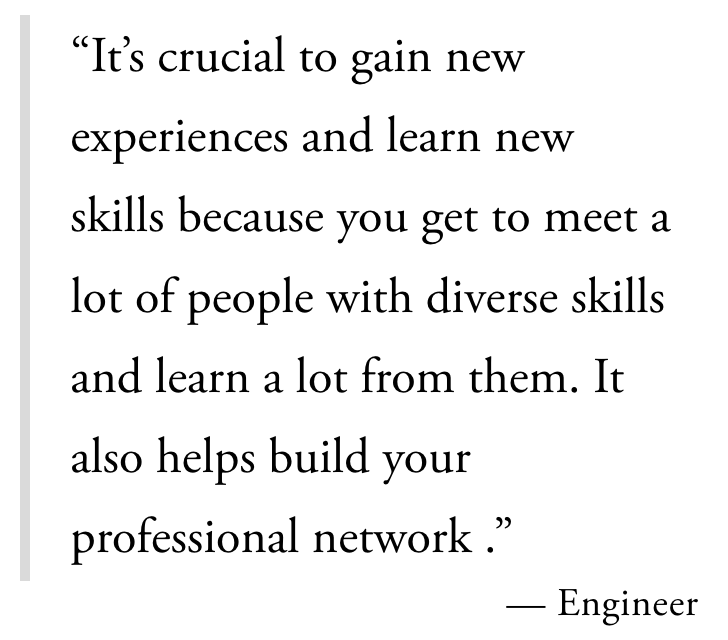
Personas, Problem Statements, Journey Maps:
From analyzing both the survey and interview responses, we were able to identify two primary user personas that would summarize our potential target audience, as well as their respective journey maps. A secondary user persona, the benefactor (investor, recruiter) was also identified. They would join the platform to find projects to invest in. Given the time frame, we focused our efforts on our primaries.
The freshers (job seekers) are seeking their first tech roles, want to learn from and network with experienced professionals in the field, and also want to gain work experience. They’re eager to break into the industry but are anxious and overwhelmed by the lack of opportunities and the amount of misinformation out there. It’s about finding the right space to reach these goals.
Problem statements that encompass the goals, needs and pain points of the freshers are:
Freshers lack clear pathways to acquire hands-on skills and gain practical experience that are essential to landing a tech job.
Freshers feeling overwhelmed and confused by the competitive job market need to build a tech professional network to help them navigate through the industry and land job opportunities.
Freshers need to find suitable job opportunities because they struggle to identify entry-level positions that match their skills and qualifications, exacerbating their feelings of uncertainty and fear about their career prospects.
In the journey map below, we see how the fresher makes their pivot into tech and joins Red Rover after struggling to find work post bootcamp graduation. It shows how the platform can be that springboard for them.
The project owners (job seekers) are those who have project ideas, are seeking teammates to join their projects, and want to commercially pursue their idea into a tangible product. Lack of time, resources, and not knowing whether or not their project is feasible can hold them back. They seek likeminded people that believe in their vision and in their project, that will put in the time and effort and see through this project in each stage. The project owner also wants to pitch their ideas for funding.
Problem statements that encompass the goals, needs and pain points of the project owners are:
Project owners need collaborators because they struggle to find people that believe in and want to work on their project within their network.
Project owners have projects they feel passionate about but don't know where to start. From the level of feasibility to project development and pitching for funding, they feel intimidated and overwhelmed by the complexity of launching a venture.
Project owners need mentorship opportunities from experienced pros to navigate the challenges of the entrepreneurial landscape.
The below journey map illustrates how the project owner comes up with an idea for a project and at first doesn’t know where to turn or what to do. Red Rover steers them in the right direction towards recruiting the right people and eventually, seeking funding for their project. They see their idea come to life.
Insights:
Due to a lack of direction, communication, and time commitment by all volunteers, the founder decided to put Red Rover project on an indefinite hold. We presented our deliverables to the entire team with recommendations as to next steps for UX research, although the project didn’t continue. A significant blocker, and what attributed to shelving Red Rover in the interim, was that we lacked a clear picture of what the platform would be and what features it would have. Once the vision was there and agreed upon, the design phase could begin and therefore, conduct usability tests on prototypes. We recommended that initial ideation sessions should be conducted in order to gain clarity on features and that both the design and research teams needed to meet regularly.
Though our involvement was short, I was pleased with the work the researcher team and I completed in the initial research phase. This volunteer experience is a tremendous example of when it’s sometimes best to step back and refocus, to do this not just for yourself but who you want to bring this idea to life for.


